Showing for the first time in Singapore, Leaves is Lucy Caldwell’s first full-length play, written when she was 24 years old. The play won the 2006 George Devine Award, the 2007 Susan Smith Blackburn Prize and the BBC Steward Parker Award. This is Passerby Projects’ maiden production, produced by Gracia Ting, Ranice Tay and Xie Shangbin, and directed by Kamil Haque, who founded Haque Centre of Acting and Creativity. Passerby Projects was founded over a year ago as a performance collective for artists to collaborate and learn from industry professionals.
The script of Leaves remains true to Lucy Caldwell’s work. Leaves is about how the Lo family deals with the aftermath of a suicide attempt of their eldest daughter, Lori (Loh An Lin), while studying abroad. It is set three days before Christmas in Belfast at the Lo household. The Los are preparing for Lori’s arrival back home with some trepidation. The parents, David (Xie Shangbin) and Phyllis (Elizabeth Gunawan) are not themselves. Lori’s younger siblings, Poppy (Ranice Tay) and Clover (Celeste Tan) are eager to meet their elder sister again, but have no idea how best to go about it. They all cannot help but wonder why Lori tried to commit suicide.
This production is designed to be an immersive home theatre experience. You are slowly clued in on the details of the play from the moment you step into the Haque Centre of Acting and Creativity.
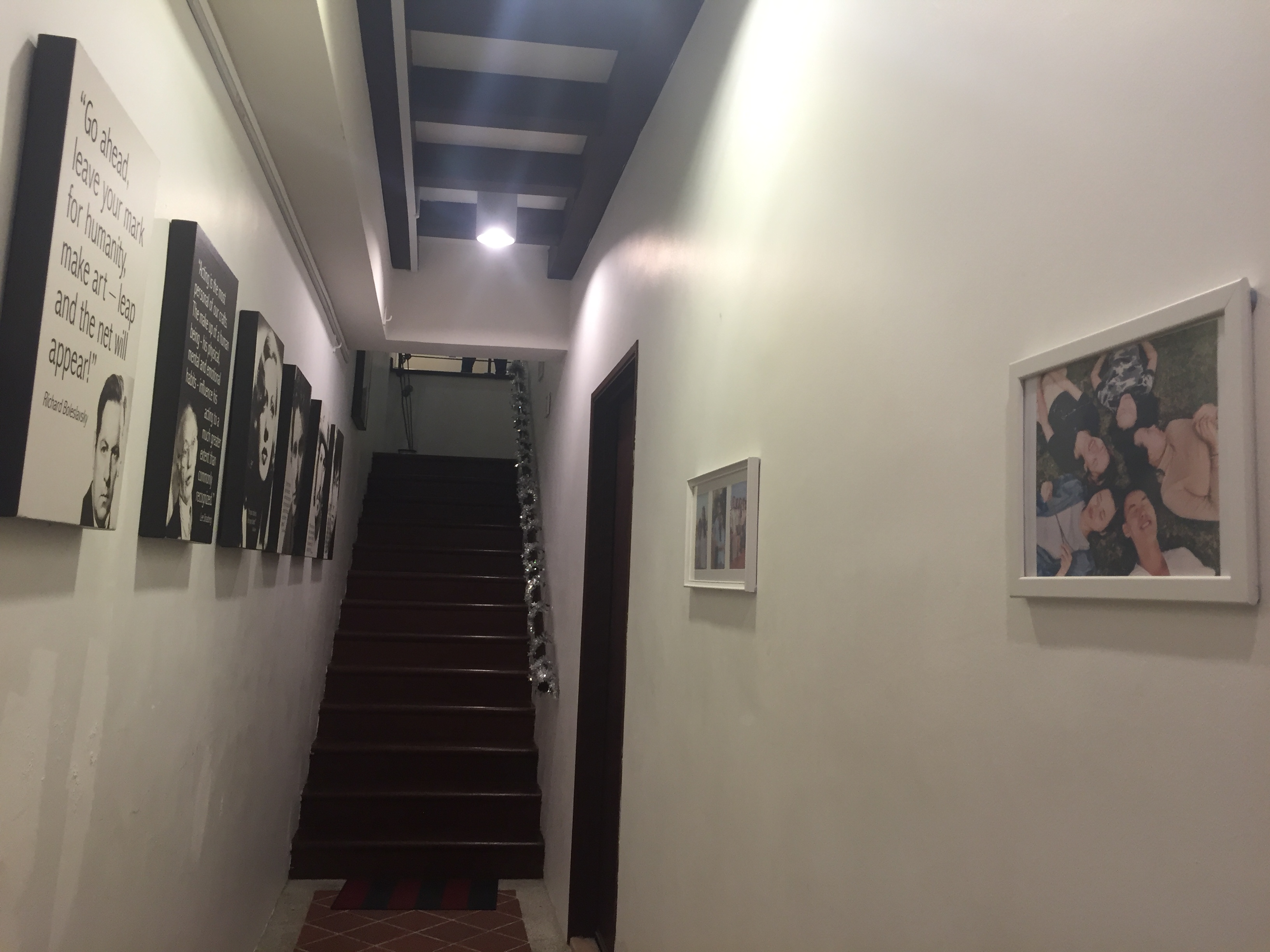 The first thing you see as you walk into the Haque Centre of Acting and Creativity, which has been transformed into a house decorated in the full swing of Christmas.
The first thing you see as you walk into the Haque Centre of Acting and Creativity, which has been transformed into a house decorated in the full swing of Christmas.
At the door, you are told to write down a secret on a small piece of paper. Then you are invited to head upstairs for the pre-show dinner. As you walk along the corridor to the stairs, you see portraits of great actors and writers adorn the wall on your left; they mirror family photos of the Lo Family on the wall on your right.
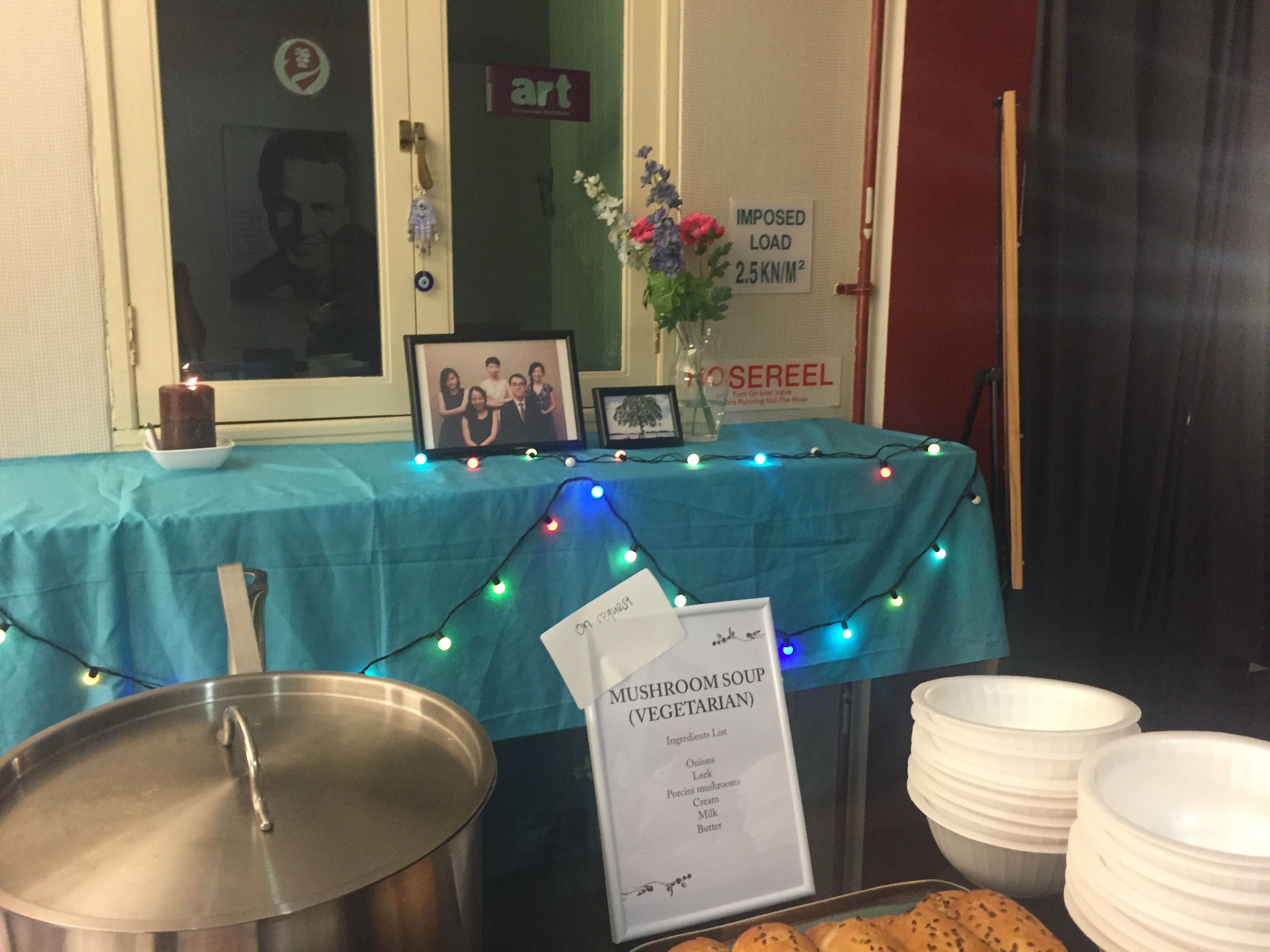 The pre-show dinner; The place is decorated with fairy lights, with Cantonese Christmas songs playing in the background. The photo of the Lo family is displayed on the table.
The pre-show dinner; The place is decorated with fairy lights, with Cantonese Christmas songs playing in the background. The photo of the Lo family is displayed on the table.
Upstairs, you are greeted with a Christmas dinner on the table and Cantonese Christmas songs blaring in your ears. This is a small adaptation to draw the link between the Asian actors and the heavy Irish script. The viewers are encouraged to mingle among the casual dinner setting. About 10 minutes before the house opens, Kamil comes out to introduce himself and to open up the box containing the little pieces of secret the audience has written on earlier. Each of us has to read aloud one of the other secret, and of course, no one admit to any secret that was exposed.
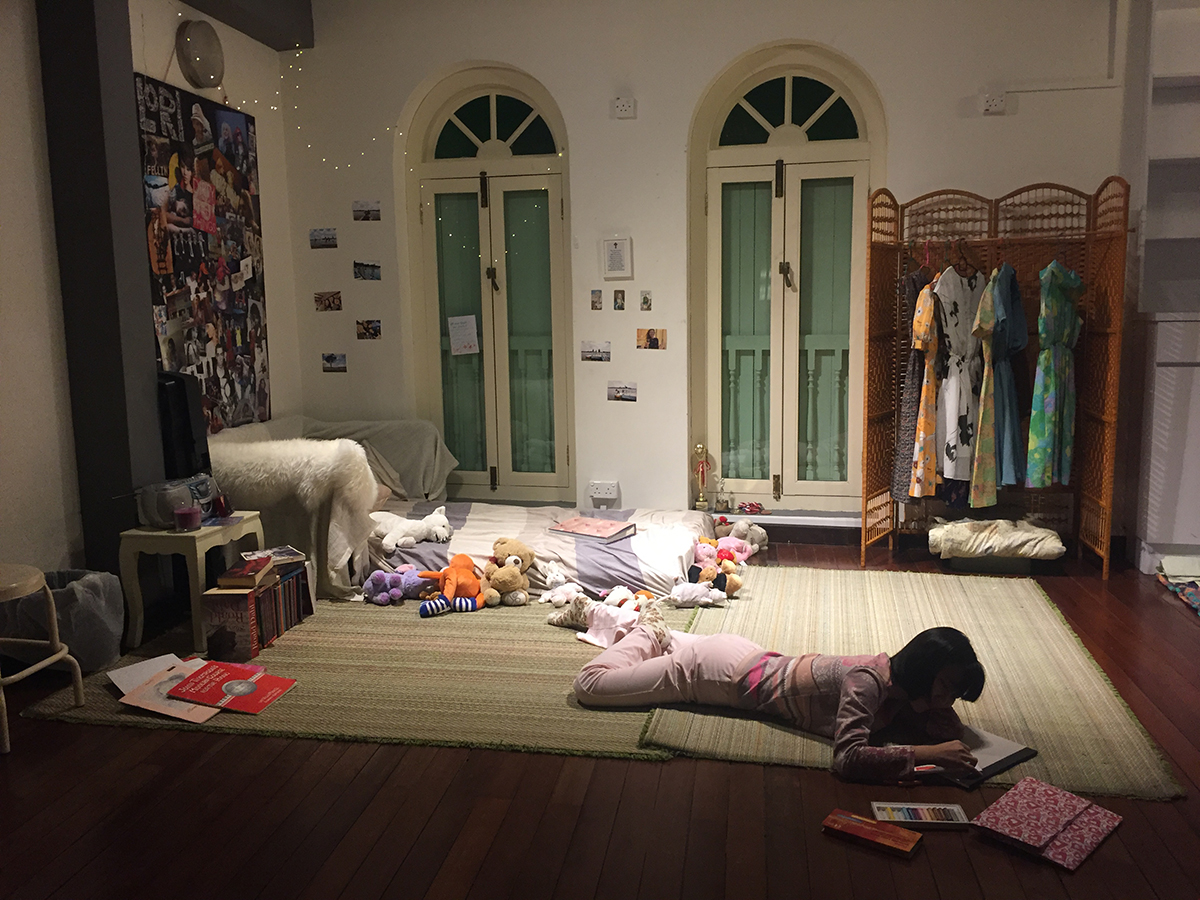 Opening scene of the play; Ranice Tay as Poppy.
Opening scene of the play; Ranice Tay as Poppy.
As you walk into the room, there is already someone there: a girl is lying on the floor humming to herself as she colours on a book. This girl is Poppy, the youngest daughter in the Lo Family. She is preparing for Lori’s arrival home.
The play consists of a small group of relatively young cast members and these five people work together seamlessly to create the image of a family. As far as acting beyond your years go, there are two camps: Elizabeth and Shangbin acting above their age as parents Phyllis and David, and Ranice and Celeste acting as the young Poppy and Clover, a girl and teenager respectively. The standout is Ranice’s portrayal of Poppy, an on-point performance as the wide-eyed perceptive girl loved by her mother but not quite fitting in with her sisters due to the age gap. Lori’s monologue is also a powerful and memorable moment that combines Lucy Caldwell’s writing and Loh An Lin’s acting chops.
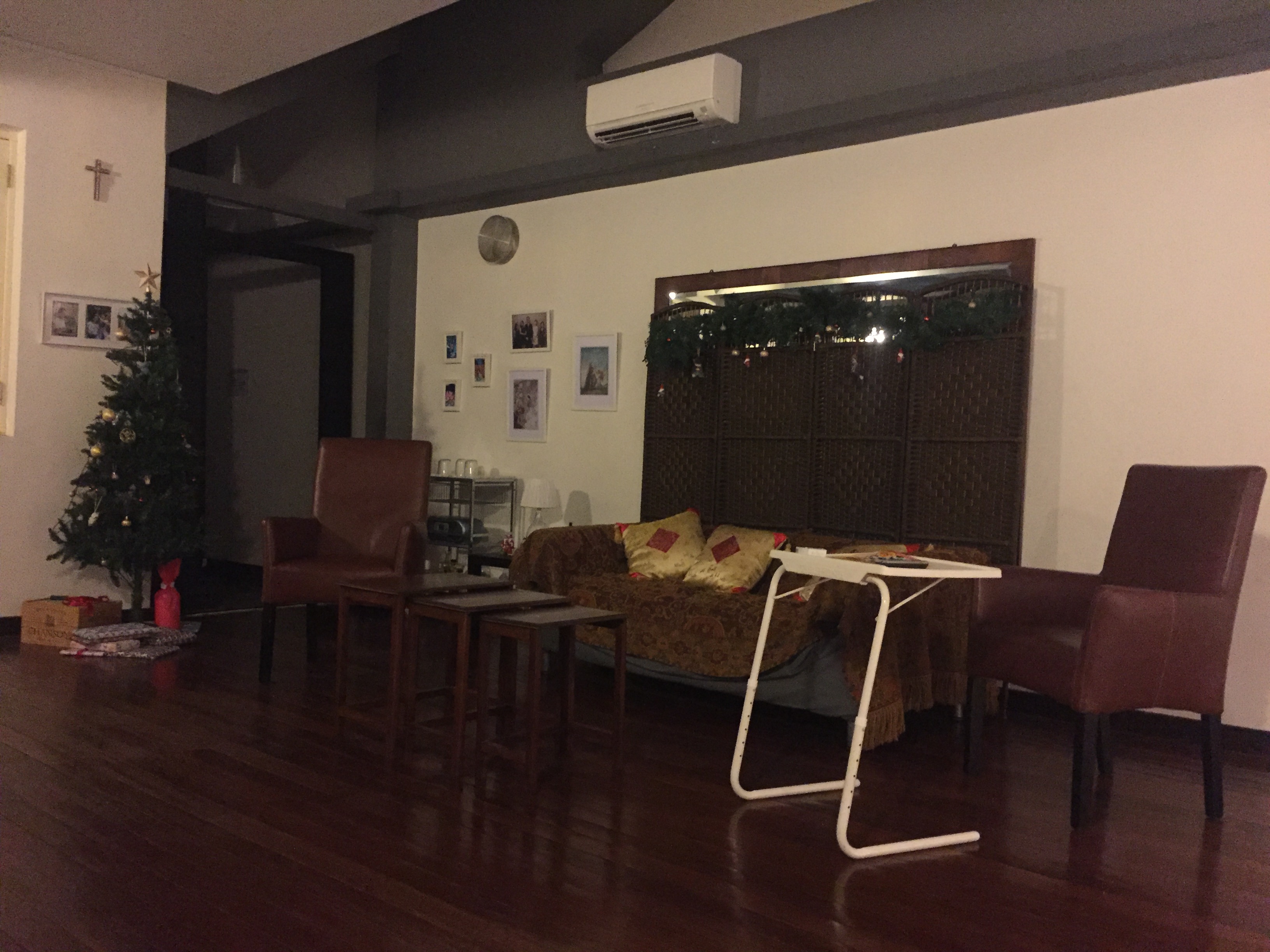 The living room of the Lo Household, where most of the scenes take place.
The living room of the Lo Household, where most of the scenes take place.
The set is brilliant precisely because of its simplicity. There is no raised podium for the stage. Instead of individual seats, sofas and rugs are positioned for the viewers to sit on. Blankets are also provided to make yourself feel right at home. When the lights suddenly all go off in the play as they exit the house, you don’t feel like you are watch a play anymore; you become aware of the fact that you are in an actual house – an intruder on something so private. Paying customer or not, the first question that pops into your head is: Should you even be here watching this?
As a viewer, you are placed in very close proximity with the actors. One of the most intense scenes in the play, a fight scene between Poppy and Clover, happens right in front of you with barely a few metres to spare. You are not just a viewer any more – you are now a passerby of the events unfolding in this play. As a passerby, what should you do? Or rather, what can you do?
And that, is what suicide most often is, isn’t it? Suicide is an intensely private affair. The decision to do take that extreme measure comes from within. This is not to say that other parties do not have any part to play in escalating the decision. But the how, the why, the where, the what and the when of the suicide attempt, those decisions rest solely on the person.
 Post-show dialogue; From left, Elizabeth Gunawan, Gracia Ting, Ranice Tay, Loh An Lin, Celeste Tan, Xie Shangbin and Kamil Haque.
Post-show dialogue; From left, Elizabeth Gunawan, Gracia Ting, Ranice Tay, Loh An Lin, Celeste Tan, Xie Shangbin and Kamil Haque.
Perhaps one of the confusion about the play is that it does not offer concrete solutions or closure on the events that occured, which can be intriguing or disturbing – depending on the kind of viewer you are. The thing is, as we watch the actors in the play trying to decipher Lori’s own thoughts and motivation that drove her to suicide, you are on the same train, as you slowly mold from an intruder into an invested member of this household.
As far as small budget local production goes, this takes the cake. It might not be a light-hearted friday night activity with your friends, but it really takes you into the world of the play. I strongly urge you to watch this play to open your eyes on this difficult topic of suicide or even if just to explore the complexities of life faced in every family.
On that note, I don’t think I can listen to the Christmas classic I’ll Be Home for Christmas and not think of this play – and that is just a small glimpse into the power of this play and the theatre.
When: 13, 14, 20, 21, 27 and 28 May 2016, 7.30pm
Tickets: Tickets are priced at S$25. For more ticketing details, visit Passerby Projects’ Page here.
Duration: 1 hour and 40 minutes (with no intermission)
Advisory: Some mature content

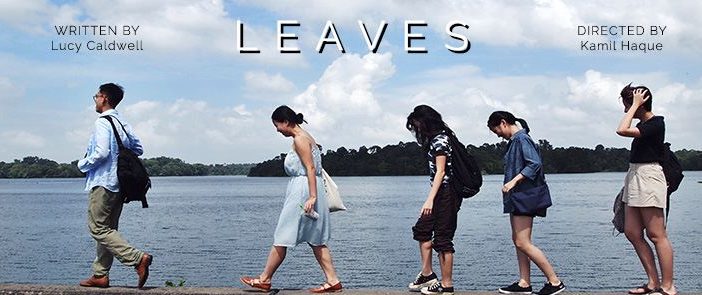



1 Comment
Pingback: REVIEW: In Search of Salt - Asia 361